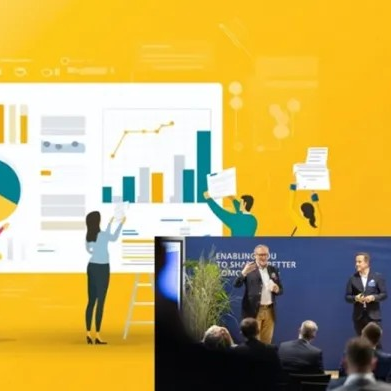
In today’s knowledge-driven economy, intellectual property (IP) is often a company’s most valuable asset. But are companies getting the most out of their IP portfolio and are business decision maker aware of the competitive IP landscape and potential IP threats? That’s where IP benchmarking and our expert Dominique Christ comes in, who is helping the C-suite to understand the importance of IP.
What is IP Benchmarking?
Simply put, IP benchmarking is the process of comparing your company’s IP assets and strategies against those of your competitors or industry leaders. It’s like looking in a mirror while also peeking at your rivals to see where you stand and how you can improve. This involves analyzing various aspects of IP, such as patents, trademarks, and trade secrets, using both quantitative metrics (e.g., patent counts, citation analysis) and qualitative factors (e.g., claim strength, market relevance).
Why should C-Level Decision Makers care?
For C-level executives, IP benchmarking offers invaluable knowledge that can directly influence strategic decisions and ultimately boost your company’s bottom line. It allows you to pinpoint your IP strengths and weaknesses compared to the competition, revealing opportunities for innovation and differentiation that can help you outmaneuver rivals. Furthermore, it ensures you’re getting the most out of your IP investments by assessing the quality and relevance of your portfolio, aligning it with your business goals, and maximizing your return. Benchmarking also acts as a risk management tool, uncovering potential threats from competitors’ IP, such as blocking patents or infringement risks, allowing you to proactively address them. Ultimately, the insights gained from IP benchmarking can inform critical decisions across the board, from R&D investments and M&A activities to licensing strategies and market entry. It even provides a clear, objective way to communicate the value of your IP to the board, investors, and other stakeholders.
Are you familiar with Dominique’s presentation about IP benchmarking for the C-suite at the CTO-Forum? Listen here to a brief audio overview:
Bridging the Gap: How IP Experts can talk to the C-Suite
IP experts can effectively communicate the value of IP to C-level executives by framing IP benchmarking in terms of its direct impact on the business. This means shifting the conversation away from technical jargon and focusing on how benchmarking can contribute to achieving core business goals, such as increasing revenue, expanding market share, or boosting profitability. Whenever possible, quantify the potential benefits – for example, by estimating potential cost savings from eliminating low-value patents or the potential revenue generated by licensing underutilized IP. Using clear visuals like charts and graphs can make the findings more accessible and highlight key insights and trends. Ultimately, speaking the language of business leaders by focusing on the strategic implications of the analysis, not just the technical details, is key. Connecting IP benchmarking to existing strategic initiatives, such as new product development, market expansion, or competitive differentiation, further demonstrates its value. By effectively communicating the benefits of IP benchmarking in this business-oriented way, IP experts can gain the support of C-level decision-makers and ensure that IP is recognized as a strategic asset that drives business success.
For more information on the determination of the value of your patent portfolio, please watch the following video:
Who can profit from it
IP benchmarking offers valuable insights to a wide spectrum of individuals and organizations. Business leaders and executives, including CEOs, CFOs, and CTOs, can leverage it to inform strategic decision-making, identify growth opportunities, and mitigate risks. Product managers can gain a deeper understanding of the competitive landscape and identify opportunities for differentiation and innovation. R&D teams can assess their own innovation efforts, identify promising areas of research, and stay ahead of the curve. IP professionals, such as patent attorneys and IP managers, can use benchmarking to enhance their services, advise clients effectively, and manage IP assets strategically. Investors and analysts can leverage benchmarking to evaluate potential investments, understand market positions, and assess the value of IP assets. Legal and consulting professionals can utilize benchmarking to support litigation, advise clients, and improve IP management practices. Even government agencies and industry associations can benefit from benchmarking to track innovation trends and develop supportive policies. In essence, anyone involved in the creation, management, or utilization of IP can gain valuable knowledge and make more informed decisions through IP benchmarking.
Get in contact with Dominique
Meet Dominique at the IP service world and unlock the full potential of IP benchmarking. Gain the knowledge and skills to navigate the complexities of IP benchmarking and learn how to approach the C-level with the topic. Become a champion of IP benchmarking to make informed decisions, and maximize the value of your intellectual property assets.

